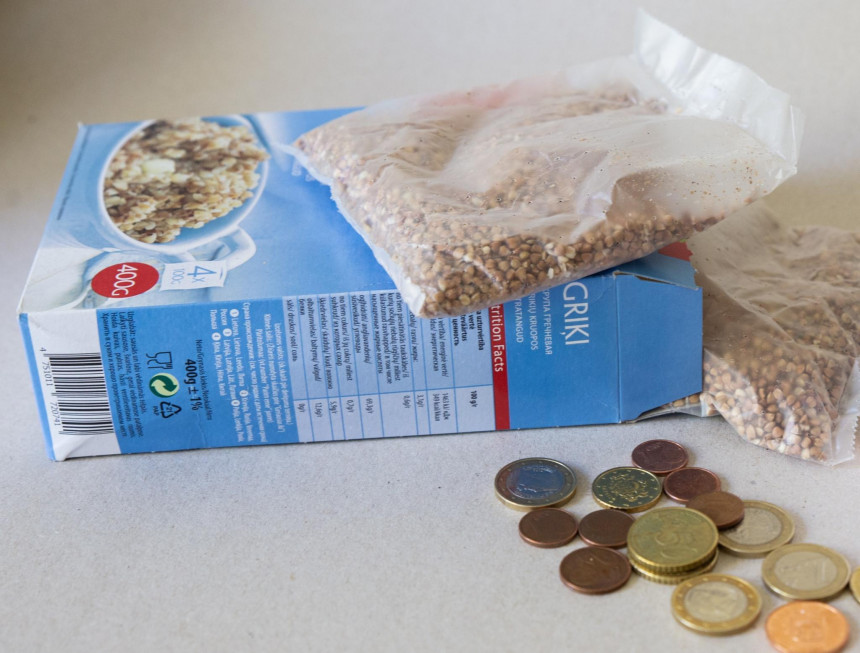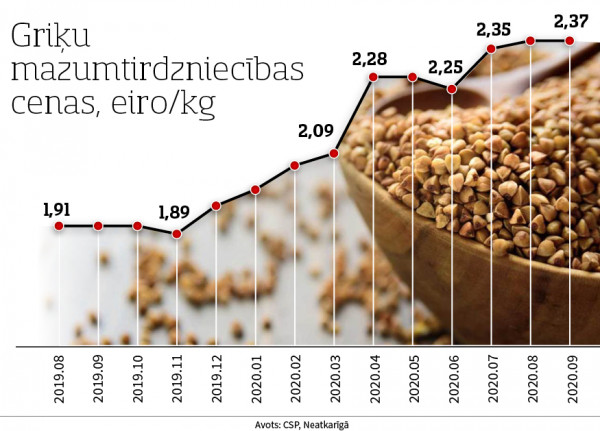Pandemic favorite – buckwheat – has gotten 22 percent more expensive

The pandemic favorite - buckwheat - is currently available in sufficient quantities in stores. After a shopping frenzy in the spring, when shoppers stockpiled food and toilet paper supplies in fear of a crisis, the agitation hadn’t flared up again. However, this increased interest in certain products has left some aftereffects. Buckwheat prices have risen by 21.7 percent in a year.
Buckwheat last September cost an average of 1.91 euros per kilogram, in September this year - 2.37 euros per kilogram, according to the Central Statistical Bureau. With the increase of interest, in April their price in stores jumped by about 20 cents per kilogram and never went back. For other products the were stockpiled during the crisis, such as salt, sugar, coffee, tea, pasta, vegetable oil, sprats, prices have risen more moderately or even fallen over time. For example, the price of salt rose by 1 cent per kilogram during the year, but sugar got a few cents per kilogram cheaper.

Data from the Central Statistical Bureau show that in the group of food and non-alcoholic beverages, prices increased by 2.2% over the year, which was influenced by the increase in the price level for fresh fruit (+23.0%), mainly apples and oranges. Prices also increased for dried, salted or smoked meat (+6.1%) and meat products (+3.7%). Coffee (+3.7%), confectionery (+2.6%), bread (+1.9%), buckwheat (+21.7%) and breakfast cereals (+12.6%) became more expensive. On the opposite side, poultry (‒5.8%), potatoes (‒12.2%), fresh vegetables (‒2.7%) and chocolate (‒1.0%) have gotten cheaper. During the month, the price of coffee rose by +3%, bread became more expensive by +0.9%, cheese and cottage cheese - by +1.2%, milk - by +2.1%, yogurt - by +2.6%. At the same time, fresh fruit and vegetables, poultry, fresh or chilled fish, chocolate, and dried, salted or smoked meat got cheaper.
Mārtiņš Āboliņš, an economist at Citadele Bank, emphasized that food prices in the world as a whole are rising slightly again, "therefore a sharp further decline in food prices in Latvia is unlikely, even though the agricultural harvest has been very good this year".
Comparing the prices of various products and services last September and this September, it can be seen that not only some food products have become more expensive, but also, for example, hairdressing services, cinema attendance, driving courses. Also, this year in September, a cup of coffee in a cafe or a cup of beer in a bar cost more than last September.
SEB Bank economist Dainis Gašpuitis explains that restrictions in certain areas (entertainment, recreation, catering) have forced them to raise prices. According to him, the activity in retail will also remain strong, as residents will compensate for lost entertainment and spending opportunities in stores. "However, shopkeepers will likely be cautious with price increases, they are likely try to keep the flow of customers and actively apply discounts. This refers more to the clothing and footwear segment. In turn, food prices will continue to increase at a moderate pace, although the entry of a new player into the market could slow it down. Most likely, its entry into the field will be quite aggressive,” warns D. Gašpuitis.
